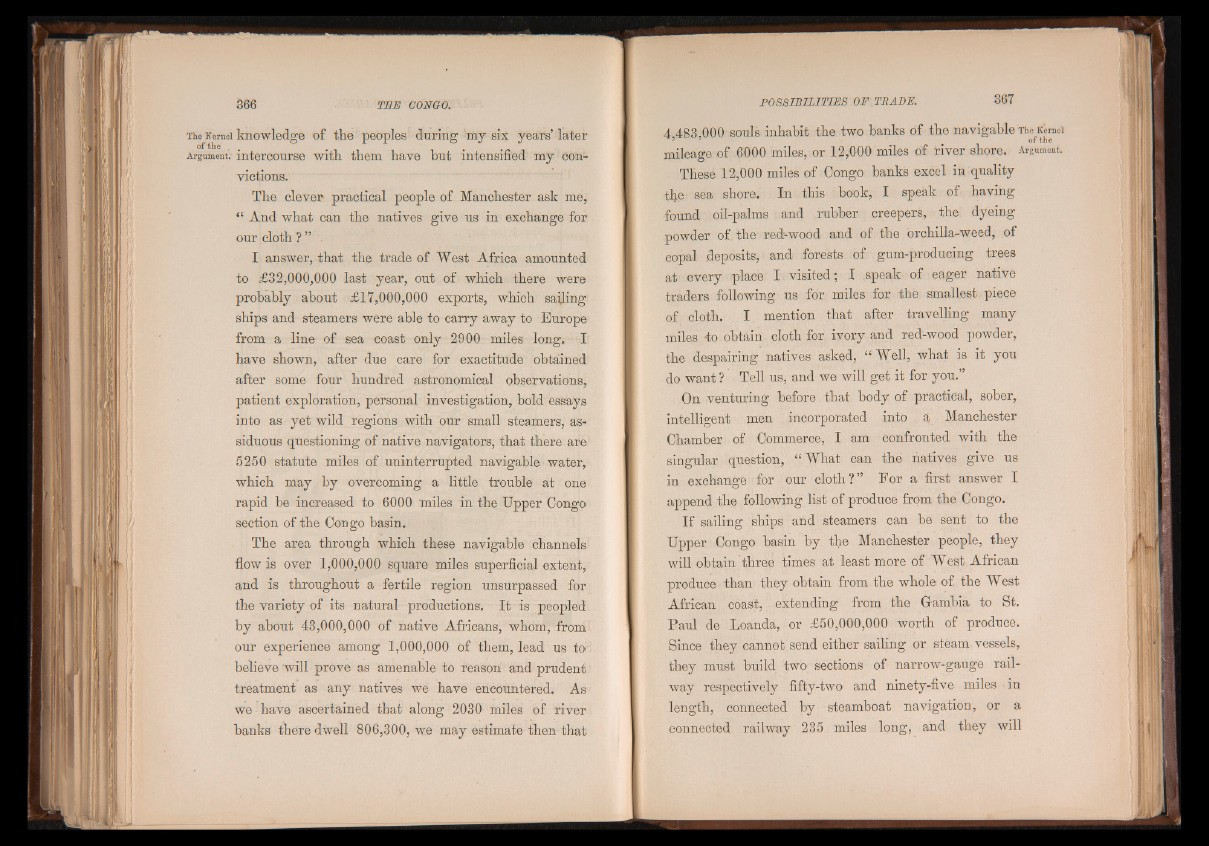
The Kernel knowledge of the peoples during my six years’ later
of the , . . ' Argument, intercourse with them have hut intensified my convictions.
The clever practical people of Manchester ask me,
“ And what can the natives give us in exchange for
our cloth ? ” I
I answer, that the trade of West Africa amounted
to £32,000,000 last year, out of which there were
probably about £17,000,000 exports, which sailing
ships and steamers were able to carry away to Europe
from a line of sea coast only 2900 miles long. I
have shown, after due care for exactitude obtained
after some four hundred astronomical observations,
patient exploration, personal investigation, bold essays
into as yet wild regions with our small steamers, assiduous
questioning of native navigators, that there are
5250 statute miles of uninterrupted navigable water,
which may by overcoming a little trouble at one
rapid be increased to 6000 miles in the Upper Congo
section of the Congo basin.
The area through which these navigable channels
flow is over 1,000,000 square miles superficial extent,
and is throughout a fertile region unsurpassed for
the variety of its natural productions. I t is peopled
by about 43,000,000 of native Africans, whom, from
our experience among 1,000,000 of them, lead us to
believe will prove as amenable to reason and prudent
treatment as any natives we have encountered. As
we have ascertained that along 2030 miles of river
banks there dwell 806,300, we may estimate then that
4.483,000 souls inhabit the two banks of the navigable The Kernel
‘ 3 ' bf the
mileage of 6000 miles, or 12,000 miles of fiver shore. Argument.
These 12,000 miles of Congo banks excel in quality
tfle sea shore. In this book, I speak of having
found oil-palms and rubber creepers, the dyeing
powder of the red-wood and of the orchilla-weed, of
copal deposits, and forests of gum-producing trees
at every place I visited; I speak of eager native
traders following us for miles for the smallest piece
of cloth, I mention that after travelling many
miles to obtain cloth for ivory and red-wood powder,
the despairing natives asked, “ Well, what is it you
do want ? Tell us, and we will get it for you.”
On venturing before that body of practical, sober,
intelligent men incorporated into a Manchester
Chamber of Commerce, I am confronted with the
singular question, “ What can the natives give us
in exchange for our cloth ? ” For a first answer I
append the following list of produce from the Congo.
If sailing ships and steamers can be sent to the
Upper Congo basin by the Manchester people, they
will obtain three times at least more of West African
produce than they obtain from the whole of the West
African coast, extending from the Gambia to St.
Paul de Loanda, or £50,000,000 worth of produce.
Since they cannot send either sailing or steam vessels,
they must build two sections of narrow-gauge railway
respectively fifty-two and ninety-five miles ■ in
length, connected by steamboat navigation, or a
connected railway 235 miles long, and they will